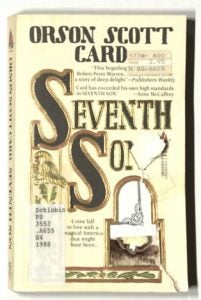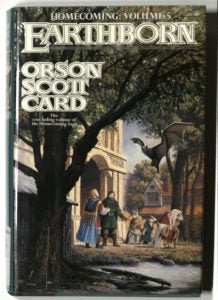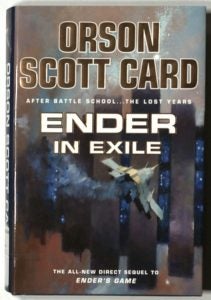Schlobin Selections #9: Orson Scott Card

Orson Scott Card at Life, the Universe, & Everything at Brigham Young University, 2008.
Over the past several weeks, we have been highlighting a select number of titles and authors from the James H. and Virginia Schlobin Literature of the Fantastic Collection. Established in 2004 by East Carolina University English Professor Roger C. Schlobin, the James H. and Virginia Schlobin Literature of the Fantastic Collection provides scholarly materials to researchers and students interested in Science Fiction and Fantasy literature. The collection consists of over 3,700 individual books, mostly primary literature in the form of novels, and collected short narratives with some additional secondary literature and scholarly criticism related to the various genres that are represented. The James H. and Virginia Schlobin Literature of the Fantastic Collection also has a related manuscripts collection which consists of nearly 5 cubic feet of materials which can be accessed online.
Orson Scott Card was born on August 24, 1951, in Richland, Washington to Willard and Peggy Card. The third of six children, Card is a descendant of many leaders and significant figures from the Church of Jesus Christ of Latter-day Saints, including Brigham Young who served as the first Governor of the Utah Territory and also helped establish the University of Utah and Brigham Young University (BYU). As a child, Card’s parents moved their family several times across Arizona, California, Utah, and Washington, often in search of employment opportunities or higher education for Willard Card, Orson’s father. From a young age, Card showed a particular talent for school and proved to be a gifted writer. After completing high school, Card enrolled at BYU where he eventually majored in theater arts. During his studies, Card produced a number of original play scripts based on the history and teachings of the Mormon Church. After completing his missionary service for the Church of Jesus Christ of Latter-day Saints, Card graduated from BYU in 1975, followed up by a master’s degree in English from the University of Utah in 1981.
After finishing his studies at BYU, Card accepted a position as the assistant editor for Ensign, a magazine published by the Church of Jesus Christ of Latter-day Saints. It was during this time that Card published his first fictional short story, titled Gert Fram, under the pen name Byron Walley. Eventually, Card decided to write and publish science fiction short stories which resulted in his famous work Ender’s Game being first published in Analog Science Fiction and Fact in August 1977. Card would later expand his 1977 short story into his 1985 novel of the same name. With the success of his science fiction short stories, Card left his position at Ensign and began his career as a professional writer. By the end of 1979, Card has published eighteen individual short stories as well as his first three books, “Listen, Mom and Dad…”: Young Adults Look Back on Their Upbringing, Hot Sleep, and A Planet Called Treason.
As Card’s career progressed, he would continue to publish both science fiction short stories as well as full-length novels. By the 1990s, Card began to branch out and wrote content for both video games and comic books/graphic novels, even having the opportunity to write a short miniseries of comics centered around the Iron Man character for Marvel Comics. In total, Card has written over fifty full-length novels, over 45 short stories, a number of comic books/graphic novels, and newspaper columns, and has worked on several feature films that are based on his work. Across all of Card’s work, his background as a playwright has helped his works be enjoyed by readers of all ages. Critics and fans of Card’s work often point to his overuse of the “child-genius savior” theme that resonates throughout many of his most famous works. Another critique of Card’s work is his consistent use of “Messiah figures” who serve as the antagonists of many of his stories. Scholars have argued that this is influenced by Card’s personal religious beliefs which are often reflected in his own work.
Throughout his career, Card has been consistently recognized by the science fiction/fantasy writing community for his work and his contributions to the genres. Over the years, Card has had several of his titles nominated for various awards and recognitions and he has been lucky enough to win many of these awards including:
- The Hugo Award three times for Ender’s Game (1986), Speaker for the Dead (1987), and How to Write Science Fiction and Fantasy (1991)
- The Nebula Award three times for Ender’s Game (1986), Speaker for the Dead (1987), and “Eye for Eye” (1988)
- The Locus Award three times for Speaker for the Dead (1987), Seventh Son (1988), Red Prophet (1989), and Alvin Journeyman (1996).
To date, Card is the only author to win both the Hugo Award and the Nebula Award in consecutive years.
Currently, the James H. and Virginia Schlobin Literature of the Fantastic Collection contains sixty-three titles from Orson Scott Card’s bibliography. A complete list of the Card’s titles that are available in the James H. and Virginia Schlobin Literature of the Fantastic Collection can be seen by visiting the Joyner Library catalog here.
- Seventh Son (1988)
- Speaker for the Dead (1992)
- Ender’s Game (2002)
- Earthborn (1995)
- Ender in Exile (2008)
- Earth Unaware (2012)
Read previous entries from Schlobin Selections.
Sources:
- “Hatrack River – the Official Web Site of Orson Scott Card.” Hatrack River – The Official Web Site of Orson Scott Card, n.d. http://www.hatrack.com/.
- Orson Scott Card papers, L. Tom Perry Special Collections, Harold B. Lee Library, Brigham Young University.
- “Orson Scott Card.” Literary Worlds: Illumination of the Mind. Harold B. Lee Library, Brigham Young University, 2010. https://web.archive.org/web/20160302035150/http://exhibits.lib.byu.edu/literaryworlds/card/.






